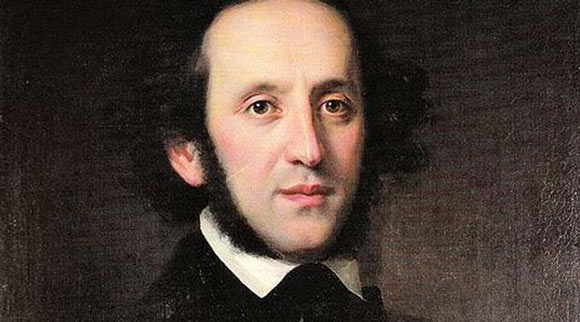
Jakob Ludwig Felix Mendelssohn Bartholdy was a German Pianist, Conductor and Composer of the early Romantic Period. Mendelssohn was known for his extraordinary talent in composition, and for founding the celebrated Leipzig Conservatory, which served as the precursor to the careers of many esteemed musicians including Edvard Grieg, Karl Richter, Emil Büchner and Sir Arthur Sullivan.
Felix Mendelssohn was born on February 3, 1809 in Hamburg. Mendelssohn’s family soon moved to Berlin in 1811 amidst political pressures. Mendelssohn and his sister, Fanny, were given an elite education. Both siblings exhibited an extraordinary amount of skill in their music lessons, and it was clear that their future in music would be no less than promising. Mendelssohn started studying the piano at the age of six with a French Pianist named Marie Bigot. Mendelssohn also studied the piano with a German Composer named Ludwig Berger. He and his teachers were highly influenced by the great German Composer, Johann Sebastian Bach, and this was highly noticeable in their music. Mendelssohn and his sister quickly became known as child prodigies in the country’s music circles. After Mendelssohn performed in a chamber music concert at age nine, he then went on to study counterpoint with Carl Friedrich Zelter.
Mendelssohn’s started writing compositions at the age of nine, but his first known works were arguably the twelve string symphonies that he wrote between 1813 and 1815, that is, between the ages of twelve and fourteen. His first published work was a piano quartet, a work that he wrote when he was thirteen. Mendelssohn’s first symphony for a complete orchestra was written when he was only fifteen years old. He then wrote an overture to Shakespeare’s “A Midsummer Night’s Dream” when he was sixteen.
Mendelssohn furthered his knowledge in music in 1824 when he studied under the Bohemian Piano Virtuoso Ignaz Moscheles, who later admitted that “there was little to teach him”. Mendelssohn then met the German Writer Johann Wolfgang von Goethe; many of whose writings Mendelssohn would write overtures to. Of these writings, Mendelssohn’s “Calm Sea and Prosperous Voyage” and “The First Walpurgis Night” were most popular. Mendelssohn then conducted one of Bach’s works, “St Matthew Passion”, for the Berlin Singakademie at the age of twenty.
After spending some time traveling, Mendelssohn returned to Berlin, where he was invited to take up the music director position at an academy in Dusseldorf. However, he was unhappy with the position, and in 1835 he decided to accept an invitation to conduct the Leipzig Gewandhaus Orchestra. In 1836, Mendelssohn premiered his oratorio “St. Paul”; the work was so successful that many regard it to be Mendelssohn’s best work. Mendelssohn spent much of his time improving Leipzig’s musical theatres and opera houses. It was in 1843 that Mendelssohn founded the legendary Leipzig Conservatory. As of 1927, it was renamed the “Hochschule für Musik und Theater “Felix Mendelssohn Bartholdy”, or “Felix Mendelssohn’s University of Theatre and Music” in his honor. At the time of its founding, Mendelssohn was assisted by Joseph Joachim, Moritz Hauptmann, Ignaz Moscheles and Robert Schumann.
Mendelssohn was also credited with multiple performances for Queen Victoria and Prince Albert in Britain.
Felix Mendelssohn died on November 4, 1847 after a series of strokes. Despite passing away at such a young age, he left behind a legacy that would have him remembered for being one of the most important musical figures in German History.